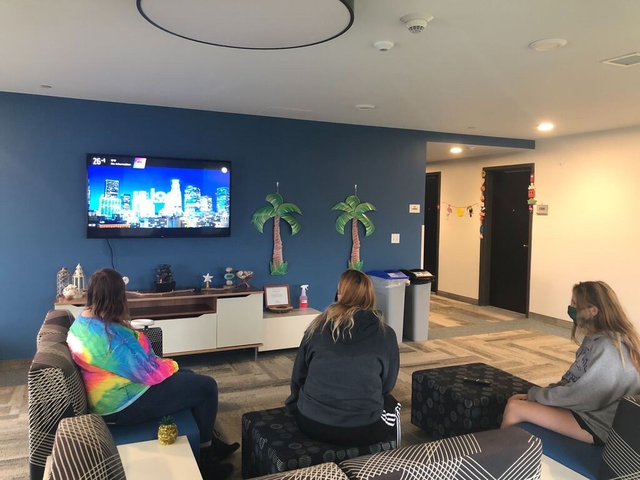When moving on campus, dorm life can be one of the easiest ways to connect with community members and make new friends. House and hall events bring people together not just from the same house, but from the other parts of the hall as well. Due to COVID-19, these events have to run differently to accommodate state protocols in order to keep everyone safe.
At the beginning of the semester, resident advisers (RA) and resident directors (RD) meet with their house to go over rules and regulations for dorm life. Typically they are held in the TV rooms with everyone in the house attending. With COVID-19 and social distancing rules, those mandatory meetings are now between RAs and with individual rooms.
Sophia Fridstrom, RD of Cedar Hall says it can be more challenging for the RA and RD to get to know their hall members without introductory meetings.
“These offices can be really intimidating and so if this is the only avenue to connect with students, or via email, it can be hard to get your personality out and let people know that you’re not just there for conduct meetings and office hours, but to goof off and help their dreams come true and empower them and go through leadership training with them,” Fridstrom said. “It’s sometimes really hard to stay motivated when you are stuck on the administrative side of this job more than we have in the past.”
In addition to not getting to know the RA or RD, the lack of mandatory meetings also prevents students from getting to know each other in the hall.
“The biggest challenge has been trying to find activities to do as a hall. My mandatory meetings had to be individually and it was difficult because the group meetings are where people interact the first couple weeks and without that, connections weren’t as strong as what they would’ve been,” said Nathan Born, sophomore student relations major and RA of Cedar West Hall. “I try and knock at people’s doors every day to ask how their day has been and do my best to make connections based on that.”
Fridstrom shares how in the past the main focus is the community at large. This year with COVID-19 the main focus is more individual relationships. Instead of seeing large house events with everyone in the same room, houses are doing more passive projects.
“We are doing more passive projects which are where someone doesn’t have to actively participate in a certain time or with a certain group of people,” Fridstom said. “They can do it on their own time or as they are passing through – it’s a gradual thing.”
While hall and house activities will look differently this year, RAs are doing their best to find unique ways to make up for the events they would have been able to do in previous years. Born shares how he implements fun activities for his house that still gets students out of their dorms and interacting with others in their house.
“As far as coming up with unique activities, I have a passive project, Flamingo Frenzy. I put flamingos throughout the hall and if you give me a number you will be put in a raffle to win NMU stuff,” Born said.
Located throughout the fourth floor of Cedar West, Born placed flamingos in all shapes and sizes down the hall that students can count up to get them out and moving around while still following the COVID-19 protocols.
Flamingo Frenzy is just one of many ways that RAs and RDs are trying to implement more passive projects to still get the students involved in activities while still staying safe. Fridstrom shares how a lot of activities will be outside versus inside, with one example being house dinners.
He, however, shares problems that he has faced while trying to continue past traditions into the new school year such as hiking Sugarloaf Mountain.
“Carpooling isn’t much of a thing this year with COVID-19 because we can only have family suites carpooling together, as in your suitemates and roommate in the same car versus anyone in the house,” Born said.
The new style of dorm life has not only been challenging for RAs and RDs but students as well. Grace Shaffer, sophomore forensic biochemistry major, says the changes have made communication more difficult.
“The elevator rule is there which is nice. It’s nice in a sense because it keeps us safe, but it’s frustrating when you can’t ride together with your roommates. The RAs aren’t allowed in your rooms which is different. With them not being able to come into your room it can be difficult in a sense of communication,” Shaffer said. “I feel like this year has made it more complicated to communicate with your RAs because of social distancing and COVID-19.”
Shaffer is a part of the population of students who are in the at-risk category for COVID-19. Shaffer says that her main priority is her health, so she doesn’t participate as much in house and hall events, but others should try and get out and participate if they can.
“It’s hard to meet people on your floor, especially this year, but just try and be open to being social, but be smart about social distancing and staying safe,” Shaffer said.
Born wants everyone to know that if you at all feel uncomfortable to not be afraid to say something. Social interactions can still be possible so long as you are smart and safe.
“Take a leap of faith, if you become uncomfortable there is nothing wrong with saying that. We don’t want people just going with it and they actually are uncomfortable with it,” Born said. “TV rooms are a good place to hang out with others in the hall. There is a gathering area by the elevator that can hold four people. Going outside though is the best way to make new friends and hangout.”
























